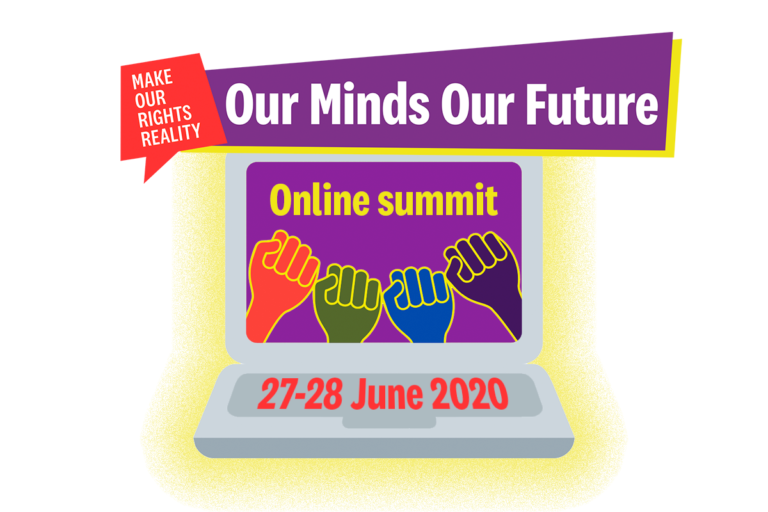On September 11th, Steering Group member Amber, spoke about the Our Minds Our Future Campaign at York’s Health and Wellbeing Board.
It was a nerve wracking experience but something she feels is definitely rewarding, too.
“As a public participant, I addressed the Board first – this was 25 individuals made up of key partners from the NHS, public health and local government. To address the Board, you have only 3 minutes. This was incredibly challenging for me as I talk and write a lot…but it did force me to hone in on key points and think about what it is I want to relay to this set of local decision makers and what outcome I wanted.”
Amber was motivated by the conversations taking place in York, which is the UK’s first and only declared Human Rights City.
In terms of outcome – the Chair of the Board, Councillor Carol Runciman, requested Amber send an email to share and discuss further as a Board, with a list of key points including an attached #MyRightsMyMind Pledge that calls on decision makers to commit to respecting young people’s rights and doing all in their power to remove the barrier young people currently face to achieving positive mental health.
Alongside this, three individuals asked the Chair if they could speak to Amber directly.
Firstly was Councillor Ian Cuthbertson, Executive Member for Education, Children and Young People, the second was Siân Balsom, Manager of Healthwatch York (Healthwatch York is the way to influence local health and social care services – hospitals, care homes, GP surgeries, home care services and many others) and lastly, Tim Madgwick, Independent Chair of the Mental Health Partnership (Tim is leading on York’s Mental Health strategy and represents mental health partnership locally). These three in particular wanted to connect after the meeting to talk further about the work the Our Minds Our Future Campaign is doing to protect young people’s mental health rights.
“I attended the full two hour meeting, and there was a heavy focus on mental health, which was stated to be a top priority of the Board”, Amber says.
“An update on the Mental Health Strategy (2018 – 2023) was delivered and a point was made about how the vision in York is for every resident to enjoy the best possible mental health and wellbeing throughout the course of their life. This was noted ‘a challenge’ but was definitely something the Mental Health Partnership were wanting to strive for.
The Board also flagged access to GP’s and doctors surgeries a particularly problematic area and spoke about the need to take a community approach to mental health.”
Our Minds Our Future works to protect young people’s right to health, particularly their mental health. This means standing up for better mental health care – for geographically and financially accessible services available to young people when they need, that are high quality, and that are culturally appropriate. The Campaign focuses on age-appropriate care, early identification and intervention, youth-participation in decision making and local provision.
Cuts in local provision mean we are picking up less on people reporting low level mental health issues and instead waiting for them to hit crisis point before intervening.
Amber was motivated by the conversations taking place in York, which is the UK’s first and only declared Human Rights City. She felt ambitions linked well to the Campaign and was reassured that locally, a rights-based approach was being considered and slowly implemented across the Board.
When asked how to address local decision makers, Amber said;
“It’s a balance, we need to recognise progress and success – where efforts have been put in to respect our rights and to ensure our experience of the mental health system is safe and smooth, but it is also important to tell these individuals what is not working, where there are gaps and what matters to us as young people. In York, resource is low. I have spoken to key individuals from York Mind who have suggested waiting times for talking therapies can be anything up to a Year – 18 months. I struggled with an eating disorder myself in 2018, but couldn’t be seen by my local eating disorders unit as thresholds were too high for an 8-bed centre, and despite my internal organs shutting down one by one, I was made to travel and to pay for private treatment.
The closure of Bootham Psychiatric hospital in 2016 took a massive toll on waiting lists and referrals in the city, it forced and still forces York residents in need of vital support to travel to mental health facilities around the region and country, which carries significant patient risk. Cuts in local provision mean we are picking up less on people reporting low level mental health issues and instead waiting for them to hit crisis point before intervening. This approach has contributed to a rise in the number of people detained under the Mental Health Act, an Act that is often overly restrictive and inadequate in providing people with the support they need. Recent cuts in the York Mental Health Crisis line has also left those requiring the service with limited alternatives at a time when their work is much needed.
It is amazing to hear that York care about human rights, yet it is evident that there is still so much work to do to improve services – right now services are not available, they are not accessible and that is a problem.
Hearing from young people directly motivates me to speak out. I have case studies from 20+ young people, three of which come from York. I have heard terrible cases whereby the individual has been diagnosed and discharged in the same letter, where waiting lists to see a professional have been so long the individual has attempted to take their own life, and where young people have had to use all their savings for education and driving lessons to be seen by someone privately, due to high thresholds for statutory treatment.”
This Campaign asks those in power to take the Pledge to support and protect young people’s right to mental health.

Amber is a member of our newly recruited Our Minds Our Future Steering Group.



